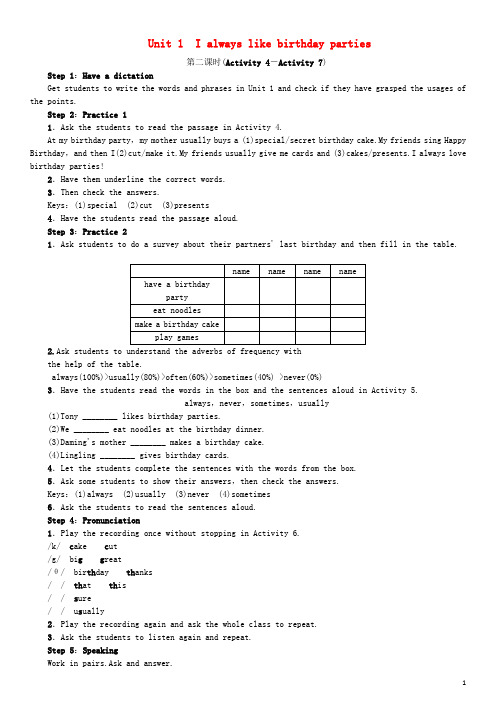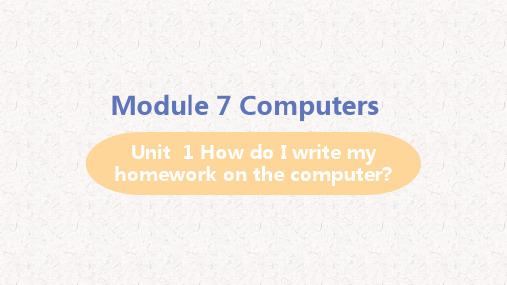初一英语上册module7——8 Computers、Choosing presents:一般现在时(3)(4)辅导教案
- 格式:docx
- 大小:133.65 KB
- 文档页数:12


Unit 1 I always like birthday parties第二课时(Activity 4-Activity 7)Step 1:Have a dictationGet students to write the words and phrases in Unit 1 and check if they have grasped the usages of the points.Step 2:Practice 11.Ask the students to read the passage in Activity 4.At my birthday party,my mother usually buys a (1)special/secret birthday cake.My friends sing Happy Birthday,and then I(2)cut/make it.My friends usually give me cards and (3)cakes/presents.I always love birthday parties!2.Have them underline the correct words.3.Then check the answers.Keys:(1)special (2)cut (3)presents4.Have the students read the passage aloud.Step 3:Practice 21.Ask students to do a survey about their partners' last birthday and then fill in the table.name name name namehave a birthdaypartyeat noodlesmake a birthday cakeplay games2.Ask students to understand the adverbs of frequency withthe help of the table.always(100%)>usually(80%)>often(60%)>sometimes(40%) >never(0%)3.Have the students read the words in the box and the sentences aloud in Activity 5.always,never,sometimes,usually(1)Tony ________ likes birthday parties.(2)We ________ eat noodles at the birthday dinner.(3)Daming's mother ________ makes a birthday cake.(4)Lingling ________ gives birthday cards.4.Let the students complete the sentences with the words from the box.5.Ask some students to show their answers,then check the answers.Keys:(1)always (2)usually (3)never (4)sometimes6.Ask the students to read the sentences aloud.Step 4:Pronunciation1.Play the recording once without stopping in Activity 6./k/ c ake c ut/g/ bi g g reat/θ/bir th day th anks// th at th is// s ure// u s ually2.Play the recording again and ask the whole class to repeat.3.Ask the students to listen again and repeat.Step 5:SpeakingWork in pairs.Ask and answer.A:What do you often/usually/always/…do on your birthday?B:I often/usually/always/…on my birthday.A:What do you often/usually/always/…do on Teachers' Day?B:I often/usually/always/…on Teachers' Day.Step 6:Homework1.Revise all the check points in this unit.2.Finish off the workbook exercises.Blackboard DesignUnit 1I always like birthday parties.(Activity 4-Activity 7) special cut presentsalways usually never sometimes。



外研版初中英语七年级上册重难点精讲Module 7 Computers重难点知识讲解1.How do I write my homework on the computer?[译文]我如何在电脑上写家庭作业呢?这个句子是行为动词的一般现在时的特殊疑问句结构。
(1)疑问词+助动词(do或does)+主语+行为动词原形+其他?在这一句式中,疑问词不作主语。
e.g.Where do I click on “new document”?我在哪里点击“新文档”呢?Where do I write the name?我在哪里写名字呢?How do you open a new document?你如何打开新文档呢?When do you use a computer?你什么时候使用电脑?What do I do next?接下来我做什么?(2)疑问词+行为动词的第三人称单数+其他?在这一句式中,疑问词作主语。
e.g.Who has a friend in Australia?谁在澳大利亚有朋友?Who shares a computer with his father?谁和爸爸一起共用电脑?(3)常用的疑问词:问时间:when问地点:where问人物:who问事物或事件:what问方式:how问原因:why问哪个:which问具体时刻:what time问哪种:what kind of问什么游戏:what games问多少:how many/how much+名词问频率:how often问一段时间:how long问什么科目:what subject(4)注意:特殊疑问句不能用Yes. /No. 回答,要用陈述句回答。
e.g.—What kind of music do you like?你喜欢哪种音乐?—I like pop music.我喜欢流行音乐。
2.Can I learn?[译文]我能学吗?learn为及物动词,意为“学,学会”。

Module7 Computers重点一、重点单词1. mouse n. 鼠标,其复数形式为 mousesMy mouse is broken, so I need to get a new one. 我的鼠标坏了,得去买个新的。
n. 老鼠,其复数形式为 miceWhen the cat is away, the mice will play. [谚]猫儿不在,鼠儿成精。
2.connect vt. 连接connect …with… 意为:把…和…连接在一起The living room connects with the toilet. 客厅与卫生间相连。
connect…to… 意为:把…连接到…How do you connect to the Internet? 你怎样连网?3. turn on 意为“打开”,多指打开电器(电视、电脑或收音机等)的开关,接通电源。
I want to turn on the television. 我想开电视。
相关短语:turn off 关掉/上;turn up 旋大,将音量调高;turn down 旋小,将音量调低4. save vt. 保存;储存;挽救,拯救;节省,节约Save the document before closing. 在关闭文档前存盘。
He can save the girl’s life. 他能救这个女孩的性命。
We should save water. 我们应该节约水。
5.share vt. 共用,分享。
share…with sb.意为“与某人分享/共用…”。
6. Internet n. 互联网on the Internet 在网上Internet plays a very important role in modern life. 互联网在现代生活中发挥非常重要的作用。
7. plan n. 计划,make a plan 制订计划; v. 计划,打算,plan to do sth.意为“计划做某事”What is your summer vocation plan? 你的暑假计划是什么?Where do you plan to spend your holiday? 你打算去哪里度假?8. search v. 搜寻,搜索,查找search for 搜寻,查找They searched everywhere for the missing child. 他们到处找失踪的小孩。
Module 8 Choosing presentsUnit 1I always like birthday parties.Language Point1、Hi, would you like to come to birthday party ?Would you like to do sth?意为“你愿意做某事吗?”,常用于有礼貌地向别人提出邀请或建议。
肯定回答一般为:" Yes,I'd love / like to......."否定回答一般为:"I'd love / like to ,but I ....."例句:----Would you like to play basketball with me ?----Yes , I'd like / love to .你愿意和我一起打篮球吗?是的,我愿意。
----Would you like to go shopping with me ?----I'd like to ,but I have to finish my homework first .你愿意和我一起去购物吗?我愿意,但我必须先完成作业。
拓展:Would like意为“想,想要”,其用法如下:1、Would like sth. 表示“想要某物”。
I would like a bike.2、Would like to do sth . 意为“想做某事”I would like to buy a book .3、Would like sb to do sth. 意为“想要某人做某事”I would like you to visit the park with us .2、I always like birthday parties . 我总是喜欢生日聚会。
always 意为“总是,一直”,其反义词为never (从不)always 总是位于行为动词之前,be动词或情态动词之后。
初一英语上册(外研版)Module 7 Computers知识点总结一、重点词汇·基本用法1. mouse n. 鼠标,其复数形式为mousesWhen the cat is away, the mice will play.[谚]猫儿不在,鼠儿成精。
2. mouse n. 老鼠,其复数形式为miceMy mouse is broken, so I need to get a new one.我的鼠标坏了,得去买个新的。
·基本用法connect vt. 连接(过去式:connected 过去分词:connected 现在分词:connecting 第三人称单数:connects)connect …with… 意为:把…和…连接在一起The living room connects with the toilet.客厅与卫生间相连。
connect…to… 意为:把…连接到…How do you connect to the Internet?你怎样连网?·基本用法turn on意为“打开”,多指打开电器(电视、电脑或收音机等)的开关,接通电源。
I want to turn on the television.我想开电视。
·知识拓展--相关短语1. turn off 关掉/上Turn off the lights when you leave.离开时把灯熄掉。
2. turn up 旋大,将音量调高Turn up the TV, I want to hear the news.把电视音量调高,我想听新闻。
3. turn down 旋小,将音量调低Turn down the radio, the baby is sleeping.把收音机调小,孩子在睡觉。
·原文再现Can I learn?我能学吗?·基本用法learn vi./vt. 学,学习(过去式:learned 过去分词:learned 现在分词:learning 第三人称单数:learns)He is learning to play the piano.他在学钢琴。